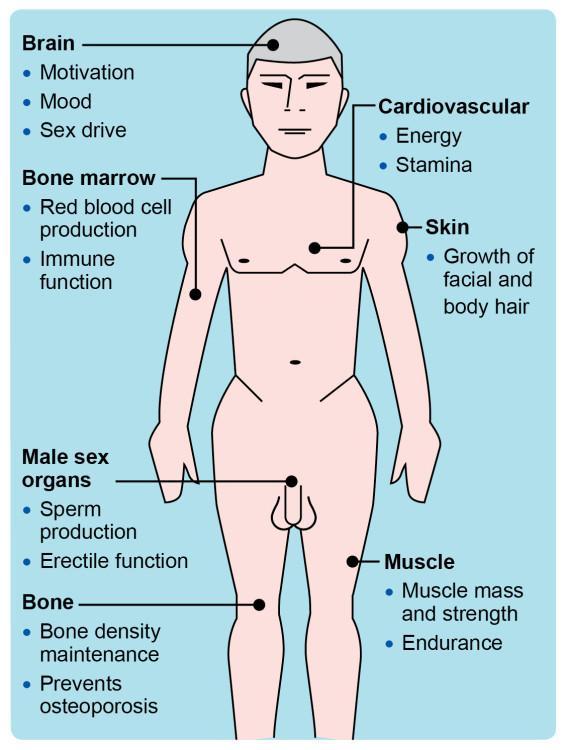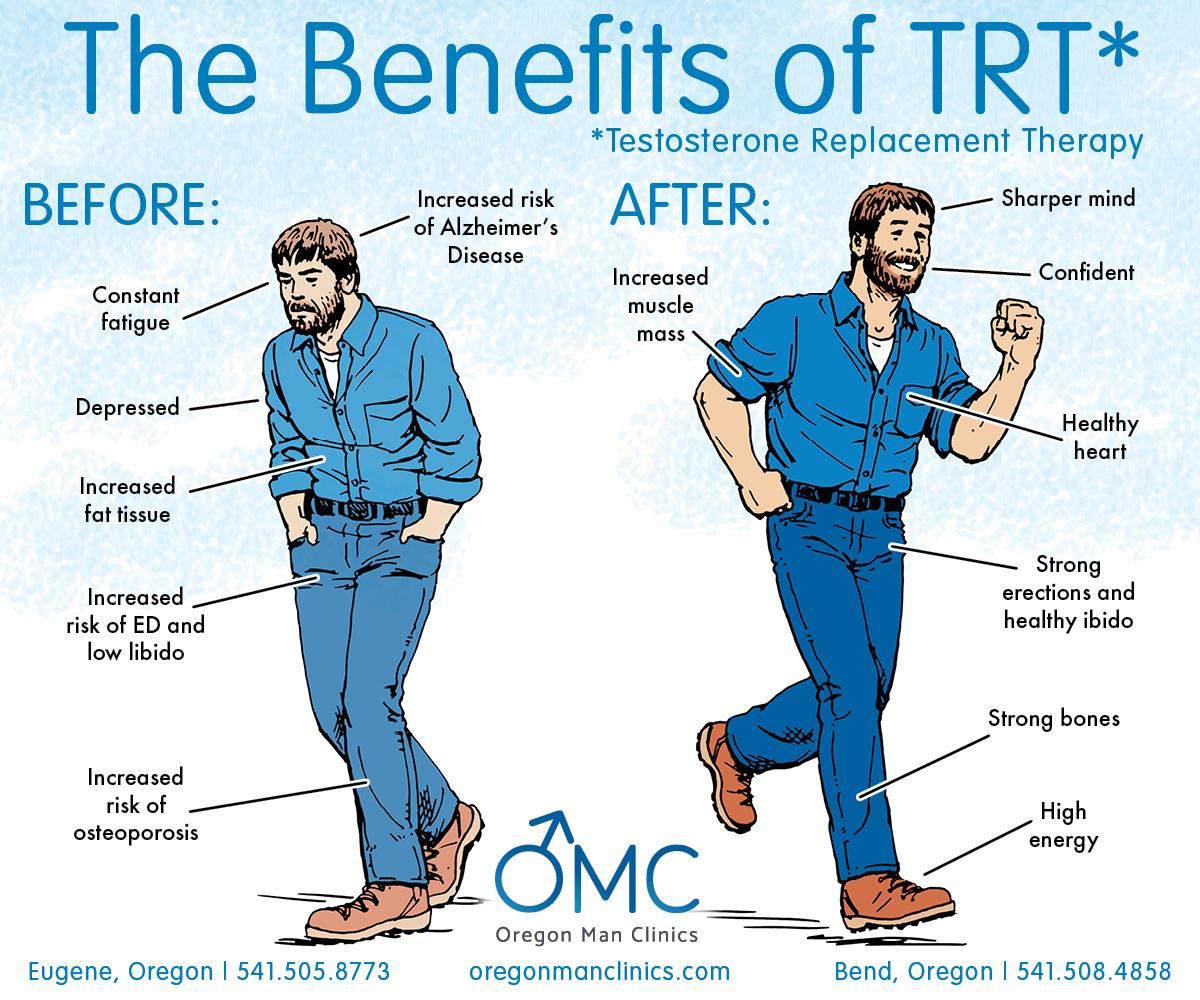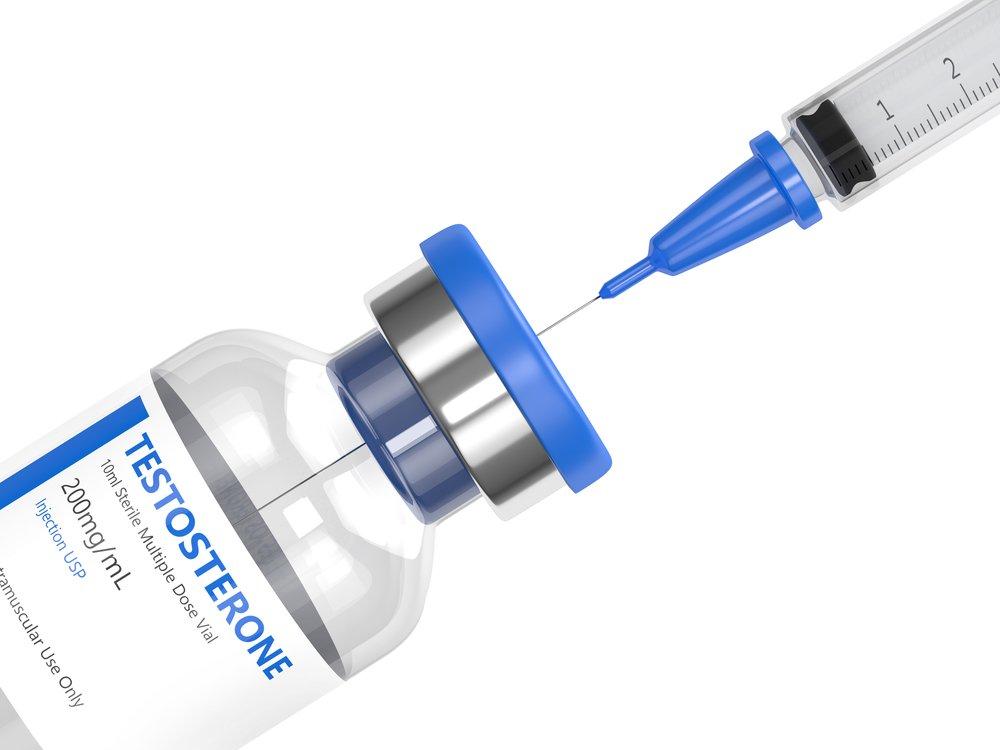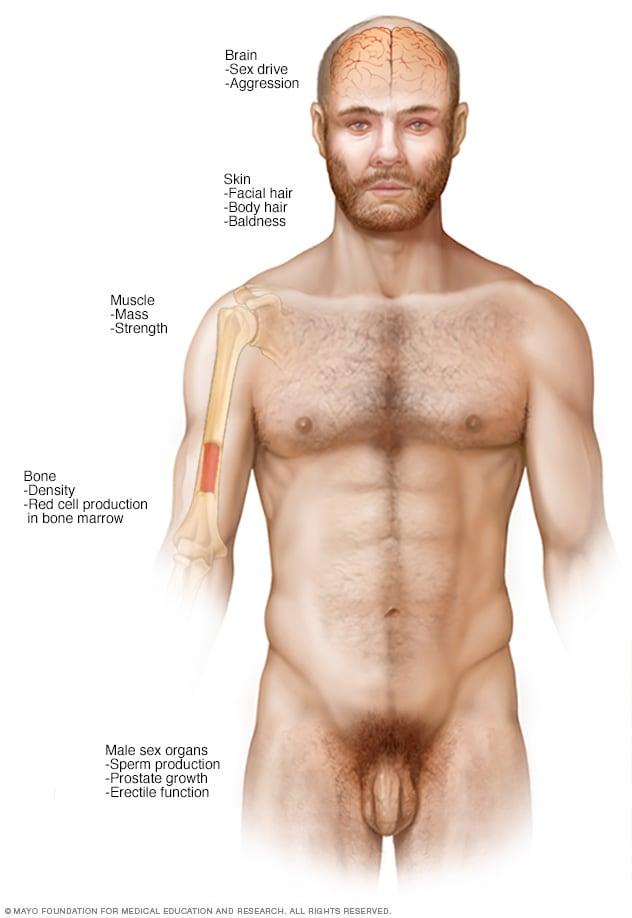In the intricate tapestry of masculinity, confidence weaves a thread that is often both fragile and formidable. For many men, the journey of self-assurance can be tumultuous, punctuated by societal expectations, personal struggles, and the pressures of daily life. Amidst this quest for confidence, an emerging avenue has captured attention: testosterone therapy. Once viewed through the lens of medical necessity, testosterone therapy is now gaining recognition not only for its physiological benefits but also for its potential to rekindle a sense of self-worth and assertiveness in men. As we delve into the nuances of this therapeutic option, we explore the intersection of hormone levels and emotional well-being, examining how a balanced approach to testosterone may pave the way for a more confident and empowered identity. Join us as we unravel the complexities of testosterone therapy and its role in fostering a renewed sense of masculinity in today’s world.
The Role of Testosterone in Male Confidence
Testosterone plays a critical role in shaping not just physical attributes but also psychological traits that contribute to a man’s confidence. This hormone influences various functions in the body, from muscle mass and strength to mood regulation and cognitive abilities. As levels of testosterone fluctuate, men may experience changes in their self-esteem and assertiveness. For many, low testosterone can lead to feelings of inadequacy and diminished social interactions, while optimal levels can enhance feelings of vigor and enhance one’s ability to engage in challenging tasks.
Several factors can influence testosterone levels and, consequently, male confidence. Consideration of lifestyle choices and natural remedies can significantly affect hormonal balance. Here are some essential aspects to look at:
- Nutrition: A balanced diet rich in healthy fats and proteins can support hormone production.
- Exercise: Regular workouts, particularly strength training, are known to enhance testosterone levels.
- Sleep: Quality sleep is crucial; poor sleep can drastically lower testosterone levels.
- Stress Management: Chronic stress increases cortisol, which can negatively impact testosterone.
| Factor | Impact on Testosterone |
|---|---|
| Nutrition | Supports production when nutrient-rich. |
| Exercise | Boosts levels through strength training. |
| Sleep | Critical for hormonal balance; REM sleep enhances levels. |
| Stress Management | Reduces cortisol, allowing testosterone to thrive. |

Understanding the Signs of Low Testosterone Levels
Recognizing low testosterone levels is crucial for maintaining overall well-being. Men experiencing symptoms such as fatigue, decreased muscle mass, or mood swings should consider getting their hormone levels checked. The body’s natural decline in testosterone can occur due to various factors, including age, stress, and lifestyle choices. Common signs that might indicate a deficiency encompass:
- Reduced libido: A noticeable decrease in sexual desire or drive.
- Erectile dysfunction: Difficulty in achieving or maintaining an erection.
- Weight gain: Increased body fat, particularly around the abdomen.
- Loss of energy: Persistent feelings of fatigue or lack of motivation.
- Depression: Feelings of sadness or hopelessness that are particularly intense.
The effects of low testosterone extend beyond physical symptoms, impacting emotional and mental health as well. Many men report difficulty concentrating or feeling irritable, which can result from hormonal imbalances. To provide a clearer understanding, consider the following table summarizing the typical symptoms associated with low testosterone:
| Symptom | Description |
|---|---|
| Fatigue | Chronic tiredness, lacking energy. |
| Muscle Loss | Decrease in muscle size and strength. |
| Mood Changes | Increased irritability and mood swings. |
| Hair Loss | Thinning or loss of body or facial hair. |

Exploring the Benefits of Testosterone Therapy
Testosterone therapy has been increasingly recognized for its potential to enhance not only physical traits but also psychological well-being in men. Increasing testosterone levels can lead to a variety of benefits that contribute directly to improved confidence. These may include:
- Improved mood: Higher testosterone levels are associated with decreased anxiety and enhanced mood, fostering a more positive outlook on life.
- Enhanced libido: The restoration of hormonal balance often leads to increased sexual desire, positively affecting intimate relationships.
- Greater energy levels: An uptick in energy can empower men to engage in physical activities, leading to improved fitness and overall vitality.
- Cognitive improvements: Some studies suggest that testosterone therapy may enhance memory and cognitive function, contributing to better decision-making and self-esteem.
Furthermore, addressing low testosterone through therapy can have profound effects on overall health. Men experiencing symptoms of low testosterone may find relief through various treatment options, which can also help with:
| Health Benefit | Description |
|---|---|
| Muscle Mass Gain | Helps to build and maintain stronger muscle tissues. |
| Fat Loss | Promotes a leaner body composition, aiding weight management. |
| Bone Density Improvement | Strengthens bones, reducing the risk of osteoporosis. |
| Enhanced Mood Stability | Reduces irritability and promotes emotional stability. |

Connecting Hormones and Mental Health
In recent years, there has been a growing recognition of the intricate relationships between hormones and mental well-being. Testosterone, often associated with physical strength and virility, plays a vital role in influencing mood, energy levels, and overall confidence. Men experiencing low testosterone levels might find themselves grappling with anxiety, depression, and a sense of diminished self-worth. As testosterone fluctuates, it can lead to significant changes in emotional stability, demonstrating how interconnected endocrine functions are with mental health.
Engaging in testosterone therapy can lead to meaningful improvements in both mood and self-perception for many men. This therapy may provide benefits such as:
- Enhanced Mood: Regular treatment can alleviate feelings of sadness and irritability.
- Increased Energy: Higher energy levels can improve productivity and interest in everyday activities.
- Boosted Confidence: Restoration of hormone levels often leads to a stronger self-image.
The following table summarizes potential effects of testosterone therapy on mental health metrics:
| Mental Health Metric | Before Therapy | After Therapy |
|---|---|---|
| Mood Stability | Low | Improved |
| Energy Levels | Fatigued | Rejuvenated |
| Self-Confidence | Waning | Restored |
Safe Practices for Starting Testosterone Therapy
Beginning testosterone therapy is a significant step that requires careful consideration and responsible action. To ensure a safe and beneficial experience, it’s crucial to consult with a healthcare professional who specializes in hormone therapies. A thorough assessment, including medical history, physical examinations, and hormone level evaluations, can guide your approach. Additionally, understanding the potential risks and benefits of therapy, such as mood changes, libido fluctuations, and metabolic effects, can help you make an informed decision.
Once you embark on this journey, adhering to safe practices will enhance the positive impact on your overall well-being. Here are some guidelines to consider:
- Regular Monitoring: Schedule consistent follow-up appointments to check testosterone levels and overall health.
- Lifestyle Adjustments: Incorporate a balanced diet and regular exercise to maximize therapy benefits.
- Open Communication: Maintain transparency with your healthcare provider about any side effects or concerns.
- Know the Signs: Familiarize yourself with potential adverse reactions, like changes in mood or increased aggression, and seek help if needed.
Lifestyle Changes to Complement Treatment
Integrating positive lifestyle changes can significantly enhance the benefits of testosterone therapy, contributing to improved energy levels and overall well-being. Regular physical activity plays a crucial role; engaging in both aerobic exercises, like jogging and swimming, and strength training can help naturally boost testosterone levels and manage weight. Additionally, prioritizing sleep is essential, as adequate rest not only aids hormone regulation but also promotes mental clarity and emotional resilience. Elevating your sleep hygiene, such as maintaining a consistent sleep schedule and creating a relaxing bedtime routine, can greatly impact your therapy’s effectiveness.
Nutrition also plays an indispensable role in complementing hormonal treatment. A diet rich in healthy fats, lean proteins, and a variety of fruits and vegetables can help support testosterone levels. Consider incorporating foods high in zinc and vitamin D, such as oysters, fortified cereals, and fatty fish, into your meals. It’s beneficial to stay hydrated and limit processed foods and sugars to maintain optimal health. To better visualize the impact of nutrition on your journey, refer to the table below, which highlights key nutrients and their sources:
| Nutrient | Sources |
|---|---|
| Vitamin D | Fatty fish, fortified milk, egg yolks |
| Zinc | Oysters, beef, pumpkin seeds |
| Healthy Fats | Avocados, nuts, olive oil |
| Protein | Chicken, tofu, beans |
Long-term Considerations for Sustainable Confidence Boosts
While testosterone therapy can offer immediate improvements in self-esteem and assertiveness, it is vital to consider the long-term implications of such treatment. Sustainability in confidence boosts relies not solely on hormonal levels but also on underlying psychological health and lifestyle factors. Individuals pursuing testosterone therapy should prioritize a holistic approach that incorporates:
- Regular physical activity: Engaging in consistent exercise helps maintain muscle mass and boosts endorphins, contributing to a more confident state of mind.
- Healthy nutrition: A balanced diet rich in essential nutrients supports both hormonal balance and mental well-being.
- Mental health support: Therapy or counseling can provide the tools to build self-esteem and resilience against life’s challenges.
Moreover, it’s crucial to monitor and adjust treatment as necessary. Long-term reliance on testosterone therapy without proper oversight may lead to complications or unsustainable dependency. Men should consider establishing a routine that includes:
| Activity | Frequency | Benefits |
|---|---|---|
| Strength Training | 3-4 times a week | Increases testosterone naturally and promotes confidence |
| Meditation | Daily | Enhances mental clarity and self-acceptance |
| Social Engagement | Weekly | Strengthens relationships and boosts self-esteem |
Q&A
Q&A: Testosterone Therapy for Men’s Confidence
Q1: What is testosterone therapy, and how does it work?
Testosterone therapy involves the administration of testosterone hormone to address low testosterone levels in men, a condition known as hypogonadism. The therapy can be delivered through injections, patches, gels, or pellets, aiming to restore hormonal balance and subsequently improve various bodily functions.
Q2: How can testosterone therapy affect a man’s confidence?
Low testosterone levels are often linked to symptoms such as fatigue, depression, and irritability, which can undermine confidence. By restoring testosterone levels, many men report enhancements in mood, energy, and libido—all of which contribute positively to self-esteem and confidence levels.
Q3: Are there specific signs that indicate a man may need testosterone therapy?
Yes, some common signs of low testosterone include decreased energy, reduced motivation, difficulty concentrating, mood swings, and a noticeable decline in sexual desire or performance. However, proper diagnosis is essential, involving medical history review and blood tests to gauge testosterone levels.
Q4: Is testosterone therapy suitable for all men?
Not necessarily. Testosterone therapy is primarily intended for those with clinically diagnosed low testosterone levels. Men considering this therapy should consult a healthcare professional to evaluate individual health conditions, potential risks, and benefits.
Q5: What are the potential risks or side effects of testosterone therapy?
While testosterone therapy can have substantial benefits, there are risks involved, such as fluid retention, sleep apnea, acne, and an increased risk of cardiovascular issues. Regular monitoring by a healthcare provider is crucial to ensure safety and effectiveness.
Q6: Can lifestyle changes impact testosterone levels and confidence without therapy?
Absolutely! Regular physical activity, a balanced diet, adequate sleep, stress management, and avoiding excessive alcohol or drug use can naturally help boost testosterone levels and enhance overall confidence without the need for therapy.
Q7: Are there psychological benefits to testosterone therapy beyond the physical improvements?
Yes, many men report a renewed sense of purpose and motivation following therapy. Improved mood and libido can lead to stronger interpersonal relationships and enhanced emotional well-being, further bolstering confidence in various aspects of life.
Q8: How long does it typically take to notice changes after starting testosterone therapy?
The timeline for experiencing noticeable changes can vary. Some men begin to feel improvements in energy and mood within a few weeks, while others may take several months before fully realizing the benefits of therapy. It’s important to maintain open communication with healthcare providers throughout this process.
Q9: What should men consider before starting testosterone therapy?
Before initiating therapy, men should consider their medical history, the potential risks and benefits, and the long-term commitment involved. A thorough discussion with a healthcare professional will provide clarity and guide them in making an informed choice.
Q10: What role does social support play for men undergoing testosterone therapy?
Social support can be invaluable. Encouragement from friends, family, and even support groups can help men navigate the emotional and psychological aspects of therapy, reinforce positive changes, and foster a sense of camaraderie during their journey toward improved confidence and health.
Conclusion:*
Testosterone therapy can be a transformative journey for many men, enhancing confidence and quality of life. However, individual considerations and professional guidance are key to ensuring a safe and effective experience.
In Summary
In the intricate tapestry of masculinity, confidence weaves a crucial thread—one that can fray over time due to various life experiences and biological changes. As we’ve explored in this article, testosterone therapy stands as a beacon of hope for many men seeking to reclaim their sense of self-worth and vitality. This treatment can offer not only physical benefits but also a renewed sense of purpose and confidence that permeates every aspect of life.
However, it is essential to approach this therapy with a well-informed perspective, recognizing that what works for one individual may not suit another. The journey toward confidence is deeply personal, shaped by individual circumstances, health considerations, and emotional landscapes. As always, collaboration with healthcare professionals remains key to navigating this path safely and effectively.
Ultimately, whether through therapy or other avenues, the quest for confidence is a shared human experience. By understanding the role testosterone plays in this journey, men can empower themselves to seek the support they need—crafting a life that resonates with authenticity and strength. And as we continue to challenge the stigma surrounding men’s health, we pave the way for open dialogues that honor vulnerability as a strength, not a weakness. Embrace the journey, for confidence is not simply the absence of doubt, but the courage to confront it head-on.










